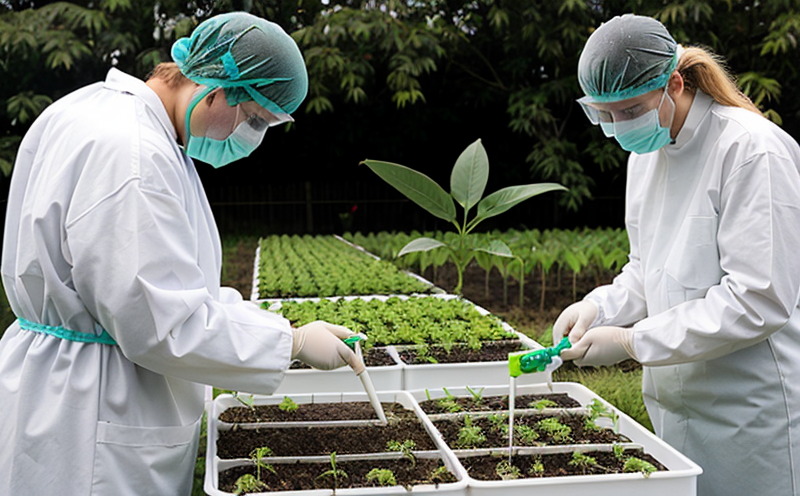Resistance Gene Screening for Pathogen Tolerance
In agriculture and forestry, plant diseases caused by pathogens can significantly impact crop yields. Resistance gene screening is a critical tool that helps identify plants with genetic resistance to specific pathogens. This service leverages advanced molecular biology techniques to screen for the presence of resistance genes in seedlings or young plants. By identifying these genes early on, breeders and farmers can focus their efforts on developing varieties that are more resilient to common diseases, ultimately enhancing productivity and sustainability.
Resistance gene screening typically involves several steps: DNA extraction from plant samples, amplification using polymerase chain reaction (PCR), and subsequent analysis via gel electrophoresis or next-generation sequencing. The process is tailored to the specific pathogen of interest, ensuring accurate identification of relevant resistance genes. This service can be particularly beneficial for crops such as wheat, maize, rice, and fruit trees that are prone to various fungal, bacterial, and viral infections.
The significance of this test lies in its ability to provide early-stage insights into a plant's genetic makeup regarding pathogen tolerance. By integrating resistance gene screening into breeding programs, researchers can accelerate the development of new varieties with enhanced disease resistance without the need for extensive field trials. This not only reduces costs but also speeds up the process of creating more robust crops.
In addition to its practical applications in crop improvement, resistance gene screening plays a crucial role in regulatory compliance and market entry strategies. Many countries have stringent requirements regarding the introduction of new plant varieties into their markets, especially for genetically modified organisms (GMOs). By demonstrating genetic resistance through this service, developers can meet these standards more effectively.
The technology behind resistance gene screening continues to evolve, with advancements in sequencing technologies and bioinformatics tools providing deeper insights. These improvements allow researchers to identify not just single genes but entire pathways involved in pathogen resistance, paving the way for even more effective breeding strategies.
- Enhanced Efficiency: Shortens the time required to develop resistant varieties by identifying target genes early.
- Precision Breeding: Enables focused efforts on specific traits rather than broad-based genetic modifications.
- Regulatory Compliance: Provides robust data needed for market entry and compliance with international standards.
- Disease Management: Helps in the strategic deployment of resources towards managing prevalent pathogens effectively.
The importance of resistance gene screening cannot be overstated, especially considering the increasing challenges posed by climate change and new disease outbreaks. As global food security becomes an ever more pressing issue, this service offers a proactive approach to ensuring that agricultural practices remain sustainable and resilient into the future.
Why Choose This Test
The decision to use resistance gene screening for pathogen tolerance is driven by several key factors. Firstly, it provides a more efficient alternative to traditional breeding methods, which can take years to produce results. By pinpointing specific genes responsible for disease resistance, this service allows for faster development of new varieties with improved resilience.
Secondly, the technology supports precision agriculture and sustainable farming practices by enabling targeted interventions rather than broad-based genetic modifications. This approach minimizes potential risks associated with GMOs while still achieving significant improvements in crop health.
Thirdly, compliance with international standards such as ISO, EN, and IEC ensures that the results obtained from resistance gene screening are reliable and universally acceptable across different markets. This is particularly important for countries seeking to export their agricultural products or introduce new varieties domestically.
Lastly, the ability to adapt quickly to emerging pathogens makes this service invaluable in today’s dynamic agricultural landscape. As new diseases emerge due to environmental changes or other factors, resistance gene screening provides a flexible framework for addressing these challenges promptly and effectively.
In summary, choosing resistance gene screening for pathogen tolerance offers a combination of speed, precision, regulatory assurance, and adaptability that is essential for modern agriculture and forestry industries. These benefits make it an attractive choice for quality managers, compliance officers, R&D engineers, and procurement professionals looking to enhance their operations.
International Acceptance and Recognition
The international acceptance of resistance gene screening for pathogen tolerance is well-established across various regions. This service has been recognized by numerous global organizations including the Food and Agriculture Organization (FAO) of the United Nations, the World Health Organization (WHO), and the International Plant Genetic Resources Institute (IPGRI).
ISO standards such as ISO 15223-4 have provided guidelines for molecular plant breeding techniques, which include resistance gene screening. Similarly, EN and IEC standards are widely adopted in Europe and internationally, ensuring that the results from this service meet stringent quality and safety criteria.
Countries like Australia, Canada, Japan, and many European nations have incorporated resistance gene screening into their national regulations for plant breeding and certification processes. For instance, in the EU, the use of specific molecular markers to identify disease resistance is part of the regulatory framework for genetically modified organisms (GMOs). This ensures that only safe and effective varieties are approved for commercial release.
The United States Department of Agriculture (USDA) also recognizes the value of this service, particularly in the context of developing pathogen-resistant crops. The USDA has published guidelines recommending resistance gene screening as part of a comprehensive strategy to combat plant diseases effectively.
Furthermore, international conferences and workshops dedicated to crop improvement often feature presentations on the latest advancements in resistance gene screening technology. These events serve as platforms for sharing best practices and fostering collaboration among researchers worldwide.
The consistent endorsement from reputable bodies underscores the reliability and relevance of this service within the global agricultural community. Farmers, breeders, and regulators can confidently rely on its outcomes when making decisions about plant health and food security initiatives.





